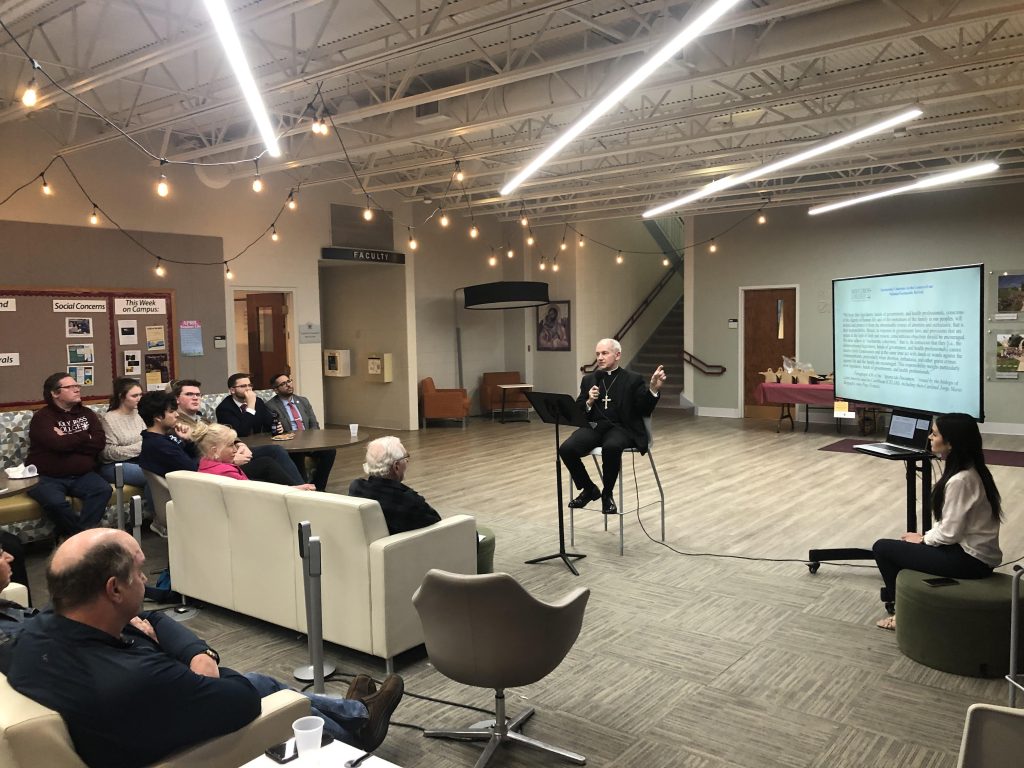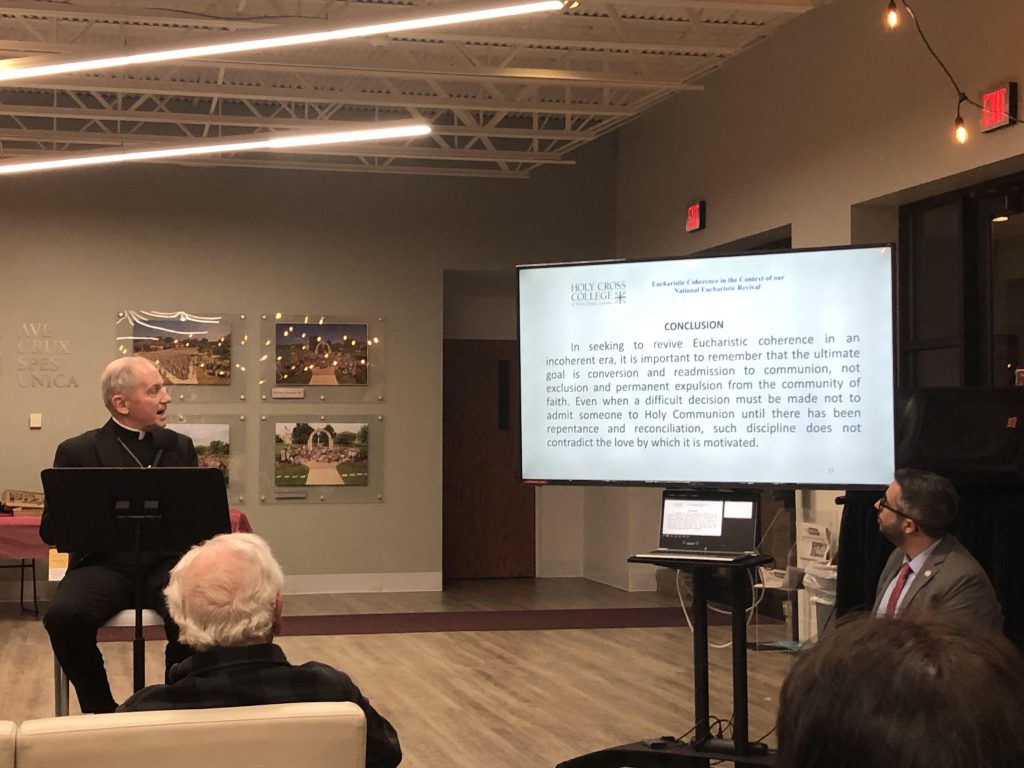May 3, 2023 // Diocese
Catholics Must Live with Eucharistic Coherence Says Holy Cross Speaker Bishop Thomas Paprocki
The National Eucharistic Revival aims to ensure Catholics are properly formed in the Church’s authentic teachings on Holy Communion and open to allowing this divine mystery to transcend their lives and relationships with others.
On Thursday, April 27, Bishop Thomas Paprocki, of the diocese of Springfield, Illinois, spoke at Holy Cross College on this necessity of the Church’s catechesis being lived out practically. With an address entitled, “Eucharistic Coherence in the Context of our National Eucharistic Revival”, Bishop Paprocki emphasized the importance of understanding this sacrament, and the entire Christian life, in terms of relationship.

Photos by Christopher Lushis
Bishop Thomas Paprocki of the Diocese of Springfield, Illinois, speaks at Theology on Tap hosted by Holy Cross College on Thursday, April 27, diving into Eucharistic Coherence in the context of the National Eucharistic Revival.
Paprocki, whose episcopal motto is “The law of the heart is love” (Lex cordis caritas), stated, “This is what the Eucharist is all about. Our Lord comes to us and wants to have a loving relationship with us.” He emphasized that human relationships usually reveal feelings of affection through physical demonstrations of love, and that a Catholic’s relationship with Jesus Christ in the Eucharist should be similar. He exclaimed, “We used to do processions with the Blessed Sacrament as visible public displays of our devotion and love. That tradition fell away for a while, as people began to perceive of religion as purely a private matter that remains hidden. We Catholics are meant to be public about our faith, and there are legal implications to this reality. That is why we have Catholic schools, hospitals, and charities. Our faith demands that we put it into action. It isn’t meant to be purely private, but also expressed publicly. Thankfully, Corpus Christi processions and other public signs of faith have begun to return.”
Throughout history, the saints have shown that union with Jesus in the Eucharist leads to a deeper love and awareness of the fundamental dignity of each person. Expanding on this notion, Bishop Paprocki drew attention to the “Aparecida Document” issued by the Bishops Latin America and the Caribbean (CELAM), including then-Cardinal Jorge Mario Bergoglio, now Pope Francis. Given that those in attendance are Catholic students of various disciplines, including not only theology, but also science, law, and leadership, Bishop Paprocki drew attention to a particular paragraph showing the necessity of living with Eucharistic coherence:
“We hope that legislators, heads of government, and health professionals, conscious of the dignity of human life and of the rootedness of the family in our peoples, will defend and protect it from the abominable crimes of abortion and euthanasia; that is their responsibility. Hence, in response to government laws and provisions that are unjust in the light of faith and reason, conscientious objection should be encouraged. We must adhere to “eucharistic coherence,” that is, be conscious that they cannot receive Holy Communion and at the same time act with deeds or words against the commandments, particularly when abortion, euthanasia, and other grave crimes against life and family are encouraged. This responsibility weighs particularly over legislators, heads of governments, and health professionals.”
Bishop Paprocki reiterated that every Catholic is required to take a sincere look at their own heart and actions, ensuring that the faith they profess with their lips also is lived out in concrete expressions of charity towards those who are in need, especially the poor and the most vulnerable. Drawing on the covenantal relationship between God and His people throughout history, he stressed that coming forward to receive Holy Communion in a state of grave sin and infidelity to God further wounds one’s relationship with Him, because it is an action not based in truth, similar to an unfaithful spouse who conceals acts of adultery while still also seeking to be intimate with their husband or wife. Both instances are incongruent, deceitful, and harmful to the true relationship. He emphasized that authentic repentance is a key component of the Christian life and is necessary for a Christian’s ongoing conversion. While the public focus is often drawn toward Catholic figures in political life, he stressed that this is also essential for the moral consider of every Catholic.
Following his talk, Bishop Paprocki answered questions from the audience, most of which focused on additional aspects of bringing Eucharistic devotion into one’s personal lived experience of the Mass or how to approach family members or friends living incongruently with the Church’s teachings. The event also drew interest from attendees beyond Holy Cross, including Father Wilson Miscamble, C.S.C, Professor of History at the University of Notre Dame. Father Miscamble posed a similar question to the bishop, asking how to reconcile the dilemma of various Church leaders giving seemingly contradictory directives or statements on Eucharistic practice. Bishop Paprocki shared this troubling concern and emphasized the necessity to pray for unity, as Jesus did with His own Church leaders at the Eucharistic banquet of the Last Supper.
The event was arranged by Andrew Ouellette, Director of Foundation and Church Relations at Holy Cross College, with the assistance of Teresa Tompkins. Newly inaugurated Holy Cross College President Marco Clark was also in attendance, as were various members of the college faculty. Ouellette shared, “Bishop Paprocki spoke with clarity and charity. His words are a reminder to all of us of the real presence of Christ in the Eucharist, and the need to properly examine our conscience before approaching the altar.”
Spencer Forslund, a junior at Holy Cross, said, “I thought that Bishop Paprocki’s talk on the Eucharist was very insightful. His comments about coherency and incoherency I found to be extremely helpful in understanding the correct terminology that should be used when discussing the topic of the Eucharist. He also answered questions in a way that didn’t show a particular bias, but gave exceptional answers to people on both sides, traditional and progressive. Overall, I thought his talk was very well put together.”
An Adjunct Professor of Law, Business, and Bioethics at the Quincy University Oakley School of Business, Bishop Paprocki has also taught at the University of Notre Dame Law School. An avid hockey player and coach as well as distance runner — he has completed 24 marathons — he has written two books on how to integrate sports and faith, both published by Ave Maria Press.
Related to Bishop Paprocki’s comments, Bishop Rhoades gave an interview this past October on the Belt of Truth Podcast to discuss the Eucharistic Revival in response to similar questions. To listen to this conversation, search for Belt of Truth on Spotify or Apple Podcasts. You can find the episode with Bishop Rhoades at open.spotify.com/episode/5qYdAx6DW1Y52KLHuLmQhA.
The best news. Delivered to your inbox.
Subscribe to our mailing list today.







